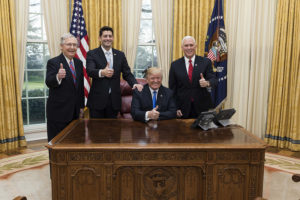
President Donald J. Trump celebrates the passage of the Tax Cuts Act with Vice President Mike Pence, Senate Majority Leader Mitch McConnell, and Speaker of the House Paul Ryan | December 20, 2017 (Official White House Photo by Joyce N. Boghosian)
In a new survey, reports the WSJ, participants say Republicans “would do a better job” with the economy than Democrats. By a 15-point margin. “This appears to be the largest Republican advantage recorded by this survey, which has been asking the question since at least 1991.”
This doesn’t mean that voters particularly like the nation’s chief economic policy maker. In fact 68% of respondents say they don’t like President Trump. But Mr. Trump appears to be setting a modern record in the share of the electorate saying that they don’t like the President personally, but approve of most of his policies. This category of voters currently stands at 20% of the electorate. For most recent Presidents such readings were generally in the low-to-mid single digits, though Bill Clinton’s share did climb into the teens.
Increased Approval of President Trump
Hand in hand with Republicans’ increased election interest is a rise in Mr. Trump’s job-approval rating to 47%, the highest mark of his time in office, with 49% disapproving of his performance. That is an improvement from September, when 44% approved and 52% disapproved of his performance.
Reducing Federal Regulation
The spike in business investment following the December enactment of Trump’s tax cuts has been encouraging. In a recent progress report, the Trump administration seems to be exceeding its own expectations, reports the WSJ.
This is affectionately known as swamp-draining to those outside the D.C. metropolitan area.
At one point the administration was aiming to cut about $10 billion in regulatory costs during the 2018 fiscal year, which ended on September 30. Now the White House’s Office of Information and Regulatory Affairs reports the elimination of $23 billion in “overall regulatory costs across the government” during the fiscal year just ended.
White House Claims More Good News to Come
In fiscal year 2019, agencies anticipate saving a total of $18 billion in regulatory costs from final rulemakings. This does not include one of the most significant deregulatory rules anticipated in fiscal year 2019, “The Safer Affordable Fuel-Efficient (SAFE) Vehicles Rule for Model Years 2021-2026 Passenger Cars and Light Trucks,” which the proposed rule estimates will save between $120 and $340 billion in regulatory costs.
Democrats Still Have One Big Advantage: Health Care
If Republicans follow Mr. Trump’s lead and contrast Bernie Sanders-style medicine—supported by most House Democrats—with GOP plans to expand consumer choice, Republicans can buck midterm history.
If you’re willing to fight for Main Street America, click here to sign up for the Richardcyoung.com free weekly email.





